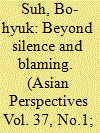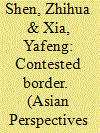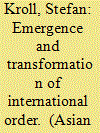|
|
|
Sort Order |
|
|
|
Items / Page
|
|
|
|
|
|
|
| Srl | Item |
| 1 |
ID:
118416


|
|
|
|
|
| Publication |
2013.
|
| Summary/Abstract |
Despite over a decade of collective efforts on the part of the international community, the North Korean human rights issue remains prevalent and pervasive. I propose "Korean human rights" as an alternative concept and approach for South Korea to constructively contribute to improving the human rights situation in North Korea. The notion of Korean human rights can be used as a method to overcome the limitations that both South Korea and the international community have faced in the past and a framework for effectively applying international human rights conventions at the regional level.
|
|
|
|
|
|
|
|
|
|
|
|
|
|
|
|
| 2 |
ID:
118413


|
|
|
|
|
| Publication |
2013.
|
| Summary/Abstract |
The contested Sino-Korean border issue has received very little study. Making use of presently available sources in the several different archives in China and Taiwan, as well as documents made public in South Korea, we examine in this article the historical background of the Sino-Korean border issue and border relations from 1950 to 1964. North Korea was dissatisfied with the Jiandao Treaty of 1909, but was uneasy about raising that dissatisfaction with the Chinese in the 1950s. When China was caught in a number of woeful domestic and international predicaments in 1962, Pyongyang seized the opportunity and proposed to Beijing that the border issue be settled. It took the two sides only six months to negotiate and sign a new boundary treaty. As a result, North Korea emerged with a larger share of Tianchi and other disputed areas.
|
|
|
|
|
|
|
|
|
|
|
|
|
|
|
|
| 3 |
ID:
118417


|
|
|
|
|
| Publication |
2013.
|
| Summary/Abstract |
In this article, we address four common, often contradictory misconceptions concerning Japanese foreign and security policy. First, Japan's strategic "normalization" is dangerous. Second, Japan is incapable of having a "normal" policy. Third, Japan is about to become "normal." Fourth, foreign and security policy under the Democratic Party of Japan (DPJ) will differ radically from what it was for fifty years under the Liberal Democratic Party (LDP). We contend that Japan is not a threat; that it has a security policy, but not one that fits well with Western models; and that Japan's security policy is changing, gradually not radically, and is not becoming just like the West's.
|
|
|
|
|
|
|
|
|
|
|
|
|
|
|
|
| 4 |
ID:
118414


|
|
|
|
|
| Publication |
2013.
|
| Summary/Abstract |
The interaction between global and local norms is the key issue of sociolegal research on globalization and world society. The global-local interaction of norms generally has two directions: world society theory, which discusses how global normative patterns shape the local legal systems they encompass, and how local actors and their interventions form and influence global legal developments. I argue in this article that both perspectives must be combined if we are to understand processes of global normative change. The global diffusion of normative models triggers local adaptations and reinterpretations that, in turn, have repercussions for the transformation of global normative models. The argument is developed by drawing on historical research on the introduction of European international law in China in the nineteenth and twentieth centuries.
|
|
|
|
|
|
|
|
|
|
|
|
|
|
|
|
| 5 |
ID:
118415


|
|
|
|
|
| Publication |
2013.
|
| Summary/Abstract |
In this article, we examine the emergence of a growing debate in China over the legacy of Beijing's Old Summer Palace (Yuanmingyuan), burned to the ground by British and French troops in 1860 and looted of its valuable antiques. The debate has arisen in response to an increased official focus on this traumatic incident in China's history, initiated by the Chinese Communist Party (CCP) as part of its ongoing quest for nationalist legitimacy. By reminding the public of the devastation inflicted by the British and French and by linking this directly to the so-called Century of Humiliation, the party has sought to present itself as the true savior of the Chinese nation. But some of China's online critics have responded negatively on the issue. Some reject the official narrative on the Yuanmingyuan incident as biased and fabricated. Others criticize the amounts of time and money that the CCP is expending in keeping the legacy alive, particularly in light of more pressing domestic issues. Most significantly, some people insist that China remains subordinate to foreign powers despite more than sixty years of CCP rule.
|
|
|
|
|
|
|
|
|
|
|
|
|
|
|
|
| 6 |
ID:
118418


|
|
|
|
|
| Publication |
2013.
|
| Summary/Abstract |
The death of North Korean leader Kim Jong-il in 2011 presents Russian president Vladimir Putin with an opportunity to regain influence on the Korean peninsula. Over the long term, Russia may reemerge as a great power in the Asia Pacific region in line with Russian geostrategic interests. Since the collapse of the Soviet Union, Russia has been marginalized on major issues in Northeast Asia. The prospect of a consistent, long-term North Korea policy under Putin places Moscow in a strong position to sustain the process of engagement with North Korea. More significantly, it serves Moscow's demographic, economic, and security interests to be a positive influence in the region in order to regain a diplomatic role in any security initiatives concerning the Korean peninsula. In this article, we argue that if and when the Russian Far East is developed, Moscow would be in a position to offset the regional strategic and economic dominance of the United States and China.
|
|
|
|
|
|
|
|
|
|
|
|
|
|
|
|
|
|
|
|
|